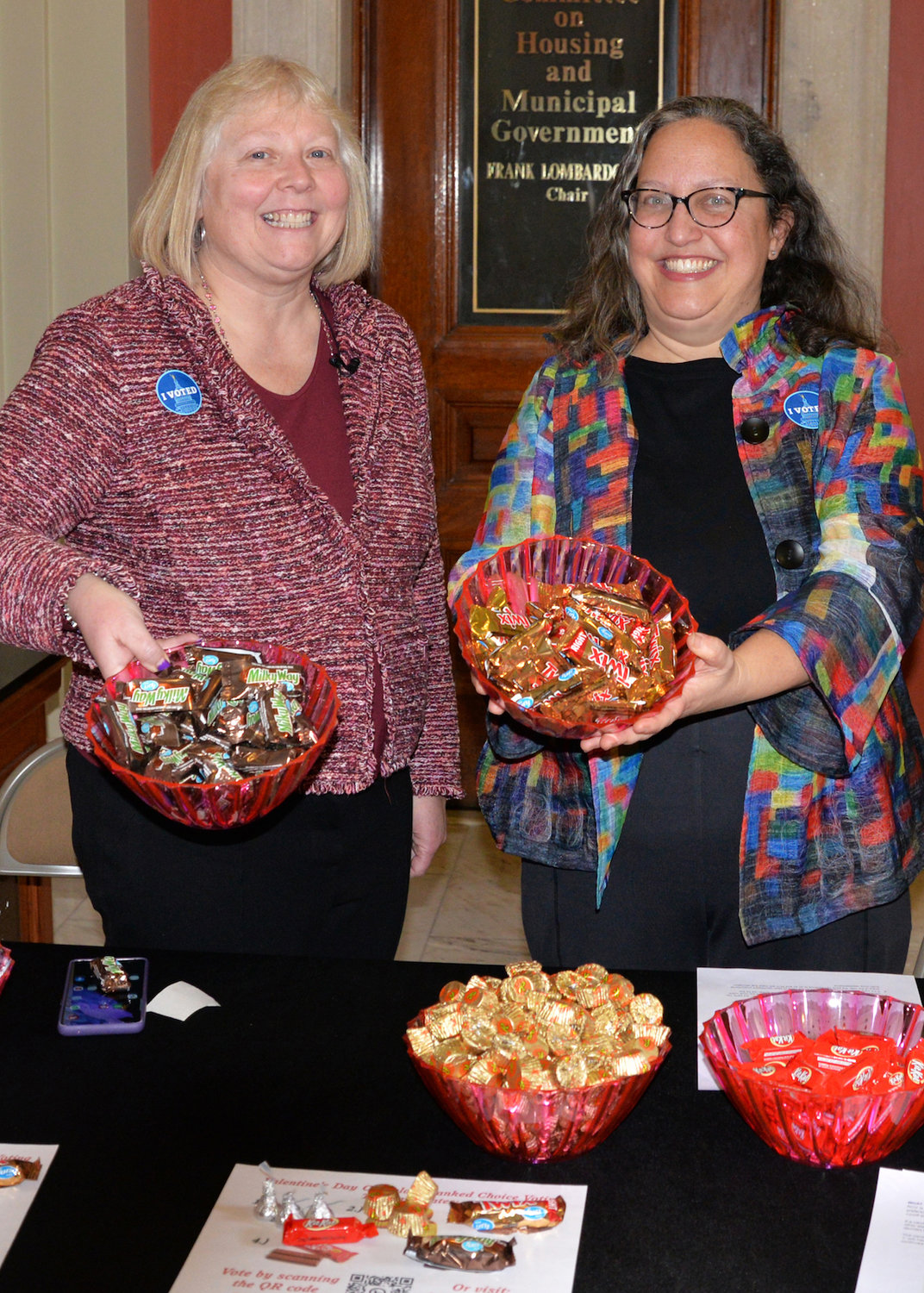Local lawmakers Lawson, Kislak submit ranked-choice legislation
Use “chocolate election” on Valentine’s Day to highlight voting system
PROVIDENCE — Two local legislators, one from East Providence and the other from just across the Seekonk River in Providence, recently surveyed the “sweet tooth” of respondents while …
This item is available in full to subscribers.
Please log in to continue |
Register to post eventsIf you'd like to post an event to our calendar, you can create a free account by clicking here. Note that free accounts do not have access to our subscriber-only content. |
Day pass subscribers
Are you a day pass subscriber who needs to log in? Click here to continue.
Local lawmakers Lawson, Kislak submit ranked-choice legislation
Use “chocolate election” on Valentine’s Day to highlight voting system
PROVIDENCE — Two local legislators, one from East Providence and the other from just across the Seekonk River in Providence, recently surveyed the “sweet tooth” of respondents while taking a light-hearted approach to highlight a serious subject.
Sen. Valarie Lawson, a Democrat who represents District 14 in East Providence, and Rep. Rebecca Kislak, a fellow Dem from District 4 on the capital city’s East Side, used a “chocolate election” on Valentine’s Day Tuesday, Feb. 14, as the premise for a demonstration on ranked-choice voting, about which each submitted formative legislation to their respective chambers earlier in the week.
Ranked-choice voting allows voters to rank the candidates in order of preference in races when there are more than two candidates. The votes are tabulated in rounds, with the lowest-ranked candidates eliminated in each round until there are only two candidates left. The one who is determined to have received the majority of the votes in the final round is declared the winner.
The bills would institute ranked-choice voting for presidential preference primaries, beginning with the 2024 presidential election. In 2020, the Democratic presidential primaries in Alaska, Nevada, Hawaii, Kansas and Wyoming all employed ranked-choice voting.
“Ranked-choice voting is an idea whose time has come,” said Lawson. “It’s being used successfully in other states, and even if the concept is a little more difficult to explain than simple majority voting, voters in those jurisdictions have been happy the process and the results. We believe that ranked-choice would improve Rhode Islanders’ satisfaction and engagement in our elections, which is a win for democracy.”
Proponents of ranked-choice voting point to its elimination of “spoiler” candidates or vote-splitting. Those situations occur when two or more candidates who appeal to a group of like-minded voters share that group’s votes, enabling the victory of a different candidate even if he or she doesn’t win a majority of the overall tally.
According to FairVote, a national organization dedicated to advancing the ranked-choice system, “voters can sincerely rank candidates in order of preference. Voters know that if their first choice doesn’t win, their vote automatically counts for their next choice instead. This frees voters from worrying about how others will vote and which candidates are more or less likely to win.” The group also asserts research exists suggesting ranked-choice voting results in more civil campaigns and less negative campaigning.
And it’s not just for presidential primaries. Ranked-choice voting is also used for state primaries and congressional elections in Alaska and Maine. In addition, more than 20 municipalities around the nation use it for local races including in New York City and Cambridge, Mass.
The “chocolate election” conducted by Lawson and Kislak was held in the State House and online. It matched Reese’s Peanut Butter Cups against Hershey Kisses, Twix, Kit Kat and Milky Way. Voters ranked the five chocolates in their order of preference.
As it turned out, it was just one vote that prevented the election from going to a second round. Of the 505 people who voted, 253 — exactly one vote more than 50% — ranked Reese’s Peanut Butter Cups as their top choice. Twix came in a distant second at 86 first-choice votes, followed by Kit Kat (75), Hershey’s Kiss (49) and Milky Way (42).
Had peanut butter cups received one less vote, the election would have gone to a second round, in which Milky Way would have been eliminated, and its 42 votes would be redistributed to the candidates chosen as no. 2 by each of those 42 voters.
While the majority vote for peanut butter cups prevented the demonstration from showing how subsequent rounds of ranked-choice voting would work, the exercise was a “sweet” victory in bringing attention to the concept of ranked-choice voting.
“With five delicious choices, this election was a good way to show people how ranked-choice voting allows you to vote for your favorite without having to worry about how other people might vote, because if your first choice is not popular, you know that your second choice will count if it would make a difference,” Kislak said. “This was a fun way to give Rhode Islanders a taste of a voting method that is gaining support throughout the country, and one that we could use in Rhode Island to give voters more of a voice than a simple pick-one ballot.”






